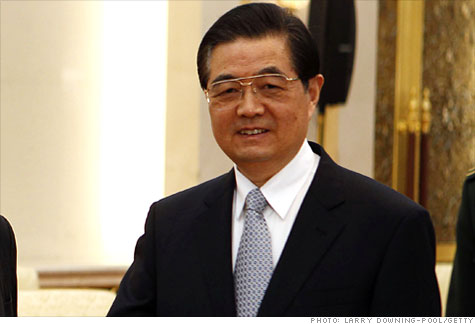Search News
 Hu Jintao, president of China, will visit the White House on Wednesday.
Hu Jintao, president of China, will visit the White House on Wednesday.
FORTUNE -- We've seen this movie before, whenever top U.S. and Chinese officials gather. Americans lecture the Chinese about a currency value that unfairly keeps their exports cheap, followed by complaints that Beijing isn't doing enough to prod its people to buy consumer goods. The Chinese counter-lecture Americans on the need to get our own fiscal house in order and our borrowing under control. Then, before getting too contentious, the officials close the session by announcing a few business deals to show that the U.S.-China relationship really isn't that bad after all.
If President Hu Jintao's visit to the White House this week follows those outlines, as is likely, it will mask a brewing crisis in U.S.-China co-dependence: A complex and invidious Chinese industrial policy that threatens to cut U.S. firms out of the trillions Beijing is spending on airports, railways, shopping centers, office complexes, hospitals and sports stadiums.

China understandably wants to promote its own firms and industries as it emerges as the driver of global economic growth. But its policies protect a class of state-owned and subsidized enterprises that also benefit from preferential bidding, "junk patents" that reward the first to file rather than the first to invent, and access to foreign technology as the price of doing business there.
"China is trying to create national champions, and to force international companies to transfer some of their technology to domestic companies," says Myron Brilliant, senior vice president of international affairs at the U.S. Chamber of Commerce and a longtime China hand. "This is not [the behavior of] a world power that should play by international standards and encourage investment."
In the short-run, Beijing's industrial policy means fewer U.S. business opportunities inside China's borders -- in the long-run, it could produce favored behemoths poised to compete globally with American firms.
This China-first policy has been uppermost in the minds of foreign executives visiting the country. This has been especially true over the past year as they increasingly find themselves playing whack-a-mole with new rules that pop up seemingly out of nowhere, or are forced to consider whether it's worth allowing access to their technology for "co-innovation" or "re-innovation" by Chinese companies in return for procurement contracts.
To get a birds-eye view of what's happening, it's worth reading a Chamber-commissioned study by James McGregor, author of the book One Billion Customers: Lessons from the Frontlines on Doing Business in China and now senior counselor in China for APCO Worldwide. McGregor's report, detailing China's "indigenous innovation" strategy, brims with troubling messages.
Technology innovation or technology theft?
For many multinationals -- especially tech companies -- the "pretense of goodwill is gone," according to McGregor, and they now see "win-win" investments in China as translating into "China wins twice," not only capturing investment but also foreign know-how. He says China's 2006 blueprint to transform itself into a science and technology powerhouse over the next decade is considered by many international companies "to be a blueprint for technology theft on a scale the world has never seen before."
McGregor offers this warning to U.S. officials and company executives: "The same ministers they meet in Beijing for friendly trade talks are also directing plans for creating Chinese technologies and companies to replace them." The country's indigenous innovation drive, he adds, "is forcing foreign technology companies to anguish over balancing today's profits with tomorrow's survival."
On the ground, foreign companies face government procurement product catalogues that overtly favor local producers. Consumer companies face detailed safety requirements -- layered on top of international standards -- "that often delay foreign products as Chinese competitors capture the market." Even a new shade of lipstick can be subjected to months of testing and certification.
At the political level, McGregor predicts China's industrial policy will trigger "contentious trade disputes and inflamed rhetoric on both sides." For the academic and scientific research community, the perception that China is pilfering Western technology could have "devastating" results -- "with the best and brightest who left China seeking academic freedom and scientific accomplishment [getting] caught in the middle of U.S.-China politics and security paranoia."
As economies in the U.S. and Europe continue to reel, a fast-growing China is on the offensive. But the fallout is the slow-drip loss of what little political support the Chinese government has left in Washington. "They are losing friends," says former U.S. Trade Ambassador Susan Schwab. "The pro-trade stalwarts in the private sector, in government, in academia and think tanks are increasingly alarmed. And these are the folks the Chinese depend on to go to the White House and Congress and push for a balanced approach" when political rhetoric gets too heated.
The public may not fully understand or appreciate the debates over the China's currency valuation. But, with America's highly attuned sense of fairness, accusations that China is stealing our technology to bolster its own industry will resonate -- loudly.
China's fiercest nationalists probably don't care. But any look into the future suggests that President Obama and his top officials are in a position to play their own form of offense. Even when China's GDP reaches that of the U.S., possibly by 2020, per capita income will be only a third of what Americans enjoy. In other words, the U.S. will continue to be a critical market for the exports they need to sell.
As Schwab ticks off the list of crises facing Beijing, from demographics to poverty to resource shortages, she notes: "I'd take our problems over theirs any day." That's something for this week's negotiators to keep in mind. ![]()






| Company | Price | Change | % Change |
|---|---|---|---|
| Ford Motor Co | 8.29 | 0.05 | 0.61% |
| Advanced Micro Devic... | 54.59 | 0.70 | 1.30% |
| Cisco Systems Inc | 47.49 | -2.44 | -4.89% |
| General Electric Co | 13.00 | -0.16 | -1.22% |
| Kraft Heinz Co | 27.84 | -2.20 | -7.32% |
| Index | Last | Change | % Change |
|---|---|---|---|
| Dow | 32,627.97 | -234.33 | -0.71% |
| Nasdaq | 13,215.24 | 99.07 | 0.76% |
| S&P 500 | 3,913.10 | -2.36 | -0.06% |
| Treasuries | 1.73 | 0.00 | 0.12% |
|
Bankrupt toy retailer tells bankruptcy court it is looking at possibly reviving the Toys 'R' Us and Babies 'R' Us brands. More |
Land O'Lakes CEO Beth Ford charts her career path, from her first job to becoming the first openly gay CEO at a Fortune 500 company in an interview with CNN's Boss Files. More |
Honda and General Motors are creating a new generation of fully autonomous vehicles. More |
In 1998, Ntsiki Biyela won a scholarship to study wine making. Now she's about to launch her own brand. More |
Whether you hedge inflation or look for a return that outpaces inflation, here's how to prepare. More |